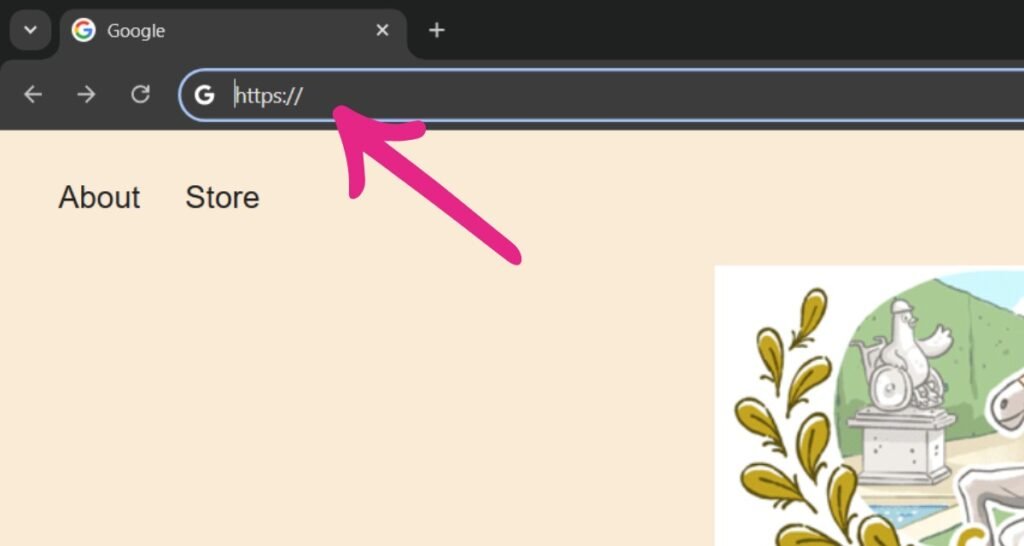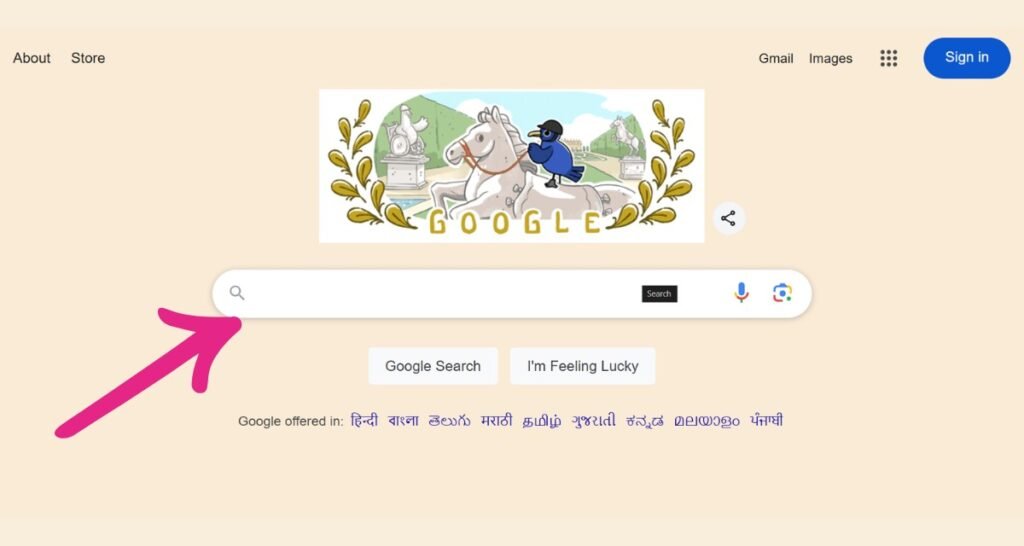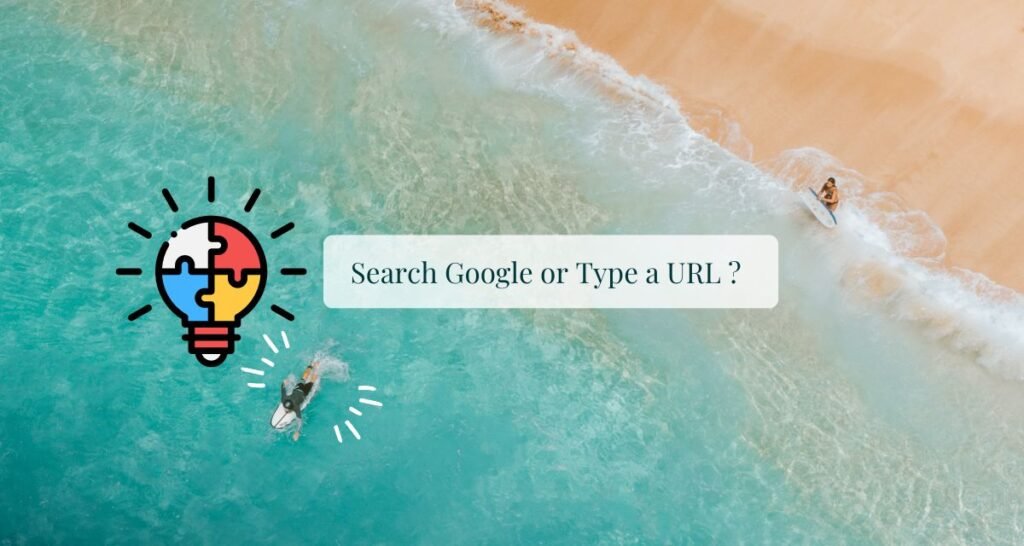Definition of the Two Methods: Google Search and Typing a URL

When you open your browser and see the prompt to “Search Google or Type a URL,” you’re being given two distinct options to navigate the web. The first method, Google search, allows you to enter keywords, phrases, or questions into the search bar. Google then provides a list of relevant results from across the web. This method is ideal when you’re looking for information on a specific topic or aren’t sure of the exact website you need.
On the other hand, typing a URL directly into the address bar is a more direct method of accessing a website. A URL, or Uniform Resource Locator, is the specific address of a web page (e.g., www.example.com). This method is useful when you know exactly where you want to go, bypassing the need for a search engine.
Understanding Both Methods Can Significantly Enhance Your Browsing Experience

Mastering the difference between choosing to “Search Google or Type a URL” can significantly improve your efficiency while browsing the internet. Knowing when to use a Google search versus typing a URL directly can save you time and ensure that you’re accessing the most relevant information or websites. In this blog post, we will explore tips and tricks to make the most out of these two methods, helping you to navigate the web more effectively.
Google Search: Your Online Assistant

A. Key Benefits
When you opt to “Search Google or Type a URL,” using the Google search function offers several advantages:
- Discover New Information: Google search is your gateway to the vast ocean of knowledge available online. Whether you’re researching a new topic or simply curious about something, entering a query into the search bar can lead you to articles, videos, images, and more. The “Search Google or Type a URL” option is particularly useful when you want to explore multiple sources of information on a subject.
- Find Relevant Content Quickly: The power of Google search lies in its ability to sift through millions of web pages in seconds, delivering the most relevant results right to your screen. By choosing to “Search Google or Type a URL,” you can quickly access content that meets your needs without having to manually browse through countless websites.
B. Tips
To make the most out of the “Search Google or Type a URL” option, here are some tips to refine your Google search experience:
- Use Specific Keywords: When you “Search Google or Type a URL,” using precise keywords can help narrow down the results to what you’re really looking for. For example, if you’re looking for a specific product review, include the product name and “review” in your search. The more specific your query is, the more accurate your results will be.
- Refine Results with Operators (e.g., AND, OR, NOT): Google search allows you to use operators to further refine your results. For instance, you can use “AND” to include multiple terms, “OR” to offer alternatives, and “NOT” to exclude certain words. By integrating these operators when you “Search Google or Type a URL,” you can filter out irrelevant content and zero in on what’s most important to you.
- Explore Google’s Advanced Search Features: Beyond basic search queries, Google offers advanced search features that can enhance your browsing experience. For example, you can search within a specific website, look for results published within a certain time frame, or even search for images based on their size or color. Utilizing these features when you “Search Google or Type a URL” can lead to more tailored and efficient searches, helping you find exactly what you need with minimal effort.
Typing a URL: Direct Access
A. When to Use

URL
While the “Search Google or Type a URL” option gives you choices, typing a URL directly is ideal in certain situations:
- Visiting Frequently Used Websites: Typing the URL directly for sites you visit often, like your email or favorite news site, takes you straight there, skipping the need to “Search Google or Type a URL.”
- Accessing Specific Content: If you know the exact URL of a page, typing it directly ensures you reach the content without sifting through search results.
B. Tips

Google Search
To enhance your experience when typing a URL:
- Bookmark Important Websites: Save time by bookmarking frequently visited sites, allowing you to access them with a single click instead of repeatedly typing the URL.
- Use URL Shorteners for Long Addresses: For long or complex URLs, use a URL shortener to create a simpler, easier-to-type link, making it more convenient when you “Search Google or Type a URL.”
Choosing the Right Method: A Quick Guide

A. Factors to Consider
When deciding whether to “Search Google or Type a URL,” keep these factors in mind:
- The Nature of the Information Sought: If you’re exploring a broad topic or unsure of the exact website, a Google search is more effective. For direct access to known content, typing the URL is best.
- Time Constraints: If you’re in a hurry, typing a URL can get you directly to a specific site faster. However, if you’re researching or comparing options, a quick Google search may save time by showing you multiple sources at once.
- The Desired Level of Control: Typing a URL gives you complete control over which website you visit, while Google search provides more flexibility in discovering related information.
B. Examples of When to Use Each Method
- Use Google Search: When you’re researching a topic, comparing products, or seeking general information, “Search Google or Type a URL” prompts you to start with a search.
- Type a URL: When you know exactly where you want to go, such as logging into an online account or visiting a specific article, typing the URL is the quickest and most direct approach.
Conclusion
To wrap up, understanding when to “Search Google or Type a URL” can greatly enhance your browsing efficiency. Google search is perfect for discovering new information and finding relevant content quickly, while typing a URL directly offers a fast route to frequently visited sites and specific content.
We encourage you to experiment with both methods to see which works best for your needs. By mastering these techniques, you’ll streamline your web navigation and make the most out of your online experience.
Q: What does “Search Google or Type a URL” mean?
A: “Search Google or Type a URL” is the default text displayed in the address bar of most web browsers. It indicates that you can either type a web address (URL) directly to navigate to a specific website or enter search terms to perform a Google search.
Q: How do I quickly switch between searching and typing a URL in my browser?
A: Most modern browsers allow you to start typing directly in the address bar. If you type a complete URL (e.g., www.example.com), the browser will navigate to that site. If you type search terms instead, it will perform a Google search automatically.
Q: What are some tips for more efficient web browsing?
Use keyboard shortcuts: For example, pressing Ctrl + L (Windows) or Cmd + L (Mac) quickly highlights the address bar.
Bookmark frequently visited sites: This saves time by letting you access them with one click.
Utilize browser extensions: Tools like ad blockers, password managers, and productivity extensions can enhance your browsing experience.
Q: Can I customize the default search engine used in the address bar?
A: Yes, most browsers allow you to change the default search engine. You can switch from Google to other search engines like Bing, DuckDuckGo, or Yahoo by adjusting your browser settings.
Q: What happens if I type a search term instead of a URL in the address bar?
A: If you type a search term instead of a URL, the browser will perform a search using your default search engine and display the search results page.
Q: How can I clear my browsing history to maintain privacy?
A: You can clear your browsing history by going to your browser’s settings. Look for options like “Clear browsing data” or “Clear history,” where you can delete your browsing history, cookies, cache, and other data.
Q: Why does my browser sometimes redirect me to a different site when I type a URL?
A: This could happen due to several reasons, such as:
Typos in the URL: A mistyped URL may lead to a different website.
Browser extensions: Some extensions can cause redirects.
Malware or adware: Infected systems might redirect you to unwanted sites. It’s a good idea to run a malware scan if this happens frequently.
Q: What should I do if my browser’s address bar is not responding?
A: If your browser’s address bar is unresponsive, try the following steps:
Restart your browser: Close and reopen the browser.
Clear your cache: Cached data can sometimes cause issues.
Disable extensions: A problematic extension might be causing the issue. Disable them one by one to identify the culprit.
Update your browser: Ensure you are using the latest version.
